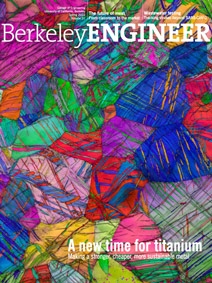
The power of yes

There are millions of startup ideas out there. But a concept’s success depends not just on its value proposition or product-market fit — it must first find a supportive environment in which to grow. Just ask master of design (MDes) graduate student Abhi Ghavalkar.
Ghavalkar’s product, Prana, is an attachment for hospital ventilators that enables up to four patients to share a single continuous positive airway pressure (CPAP) machine, a noninvasive device that delivers a constant level of air pressure to a patient’s upper respiratory tract. The new system will cost less than $2,500 per unit serving four patients, compared to traditional noninvasive ventilators that cost up to $17,000 per unit per patient.
The medical device could address ventilator shortages around the world for numerous respiratory conditions, including chronic obstructive pulmonary disease (COPD). Noninvasive ventilators can also support pre-term infants whose lungs have not yet fully developed.
The first prototype was developed in 2019 by Ghavalkar and Zach Mudge, a former classmate from Loughborough University. With about £50 ($68), Mudge bought some plumbing pipes and valves from a hardware store, attached four balloons to simulate lungs and connected the setup to his vacuum cleaner to prove that the splitter could regulate the amount of air that each patient received. The next step was to prove that the system could work in a clinical setting with medical grade parts. But without funding or a support team, progress hit a standstill.
In late 2020, Ghavalkar arrived in Berkeley to begin the MDes program. After connecting with fellow MDes students Mercedes Saldana and Peipei “Penny” Lin, he won a student grant from the Jacobs Institute for Design Innovation to create a second prototype.
Ghavalkar also took a challenge lab through the Sutardja Center for Entrepreneurship & Technology, with the goal of launching a startup and having a working prototype by the end of the semester. Athena Lopez, a bioengineering undergrad, joined the team, and suddenly, Ghavalkar found himself surrounded by enthusiastic peers, experienced faculty, even grant funding. The path of “nos” he’d been on was suddenly turning into one of “yeses.”
Since then, work on Prana has continued to accelerate. The team has expanded to 12, built a second prototype using medical grade parts and electronics, and coded the device to get it operational. This year, Prana won honors at the New York Product Design Awards, Fast Company’s World Changing Ideas Awards, the San Francisco Design Week Awards and the Core77 Design Awards.
The team was a accepted into the CITRIS Foundry incubator and the Berkeley SkyDeck Accelerator’s Pad-13 program. The group hopes to submit a product for medical device approval within a year and have one batch operational in the market within the next two to three years.
Looking forward, Ghavalkar feels more optimistic than ever about the startup. “This project would have died if I hadn’t come to Berkeley,” he said. “Just knowing that I have access to so many fantastic people and resources — that’s lifted our effort more than anything else. I couldn’t be more grateful to be here.”
Learn more: The culture of yes
